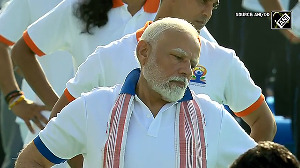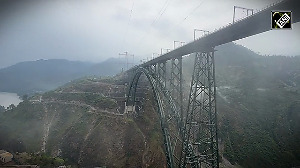Russia and China failed to resolve differences with other veto-wielding permanent members of the United Nations Security Council over the language of the presidential statement on Iran's nuclear programme, as they argued that demanding Tehran to stop uranium enrichment would harden its stance.
Complete Coverage: The Iran Vote & After
During the third meeting of the P-5 on the Iranian nuclear question in United Nations on Monday, Russia and China rejected the proposal of US, France and Britain who had wished for a strong statement against Tehran, according to diplomats.
Britain, US and France wanted the Council to demand that Iran stop its uranium enrichment plans but without giving any threat, believing that such a text could further isolate Tehran and compel it to abide by demands from International Atomic Energy Agency, the UN nuclear watchdog.
But Russia, which is expected to have another round of talks with Iran shortly, and China argued that such a course would harden the stand of the Arab country and in any case, it was within its right under the Nuclear Nonproliferation Treaty to enrich uranium for peaceful purposes. They want the Council to reaffirm the role of the IAEA and demand that Iran cooperate with it.
Another point of contention is as to whom the IAEA Chief should report on Iran's compliance or otherwise, now that the issue is before the Security Council. While the US, Britain and France will like him to report directly to the UNSC as it is now seized of the matter, Russia and China want him to report to the IAEA Board, which could then inform the Council of the findings.
Should Russian and Chinese proposal be accepted, it would mean the issue will go back to IAEA Board and out of the hands of the Security Council, a possibility that the remaining three permanent members dread. The Council diplomats say it would like to issue some sort of statement during the current week.
Britain and France plan to circulate the draft of their statement among the remaining 10 non-permanent members of the Council apparently to put pressure on Russia and China to budge from their position though so far they have shown little interest in changing their views, they said.
American diplomats, including its UN Ambassador John Bolton, are of the view, articulated publicly several times, that Iran is continuing to negotiate without giving in to gain time to develop its nuclear weapon capability. They are not surprised that Tehran is always ready for talks, they say.
Their diplomats also hold out the possibility of the United States trying to gather a 'coalition of the willing' to impose sanctions on Iran outside the UN framework if Russia and China continue hold on their position.





